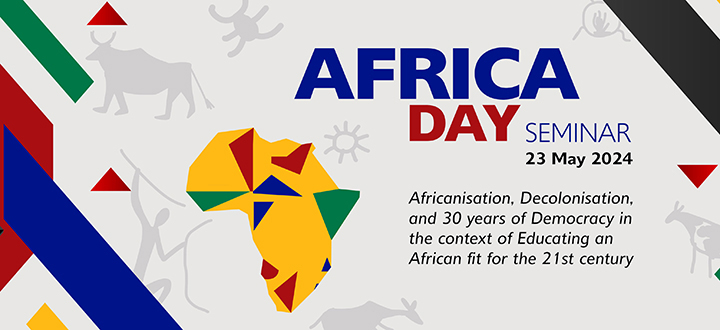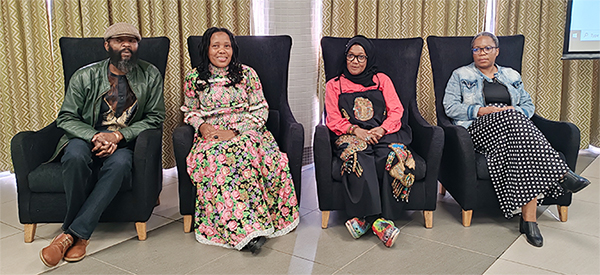News & Media
Africa Day seminar - exploring the future of African graduates
On 23 May 2024, Unisa’s Department of Leadership and Transformation (DLT) hosted the Africa Day seminar at the Muckleneuk Campus. This year’s theme was "Africanisation, Decolonisation, and 30 years of Democracy and our reflections on Educating an African fit for the 21st Century".
The theme was conceptualised from the United Nations Educational, Scientific and Cultural Organisation (UNESCO) and African Union (AU) theme, which is "The Year of Education – Educate an African fit for the 21st Century". The focus of this seminar was to examine how to build resilient education systems for increased access to inclusive, lifelong, quality, and relevant learning in Africa. In addition, the seminar provided an opportunity for researchers to showcase the work that has been done in the areas of Africanisation and Decoloniality in various academic fields.
The key objectives of the seminar were:
- To offer a forum for exchanging ideas and continuing the conversation about developing resilient educational systems so that more people in Africa have access to inclusive, relevant, high-quality, and lifetime learning.
- To draw attention to the efforts made – and acknowledge the work that remains – in Universities to Africanise and decolonise knowledges.
- To present cutting-edge initiatives, programmes, and research aimed at transforming the curriculum and institutional culture of Unisa.

Prof William Mpofu (Researcher: Wits Centre for Diversity Studies), Dr Nompumelelo Radebe (Senior Lecturer: Unisa's Department of Anthropology and Archaeology), Dr Shahieda Jansen (Deputy Director: Academic and ICT Support Services Unisa's Western Cape Region) and Bridgette Ngobeni (Employment Equity Officer: Unisa's Department of Leadership and Transformation).
Formerly known as African Freedom Day, Africa Day is celebrated in the continent and globally to challenge colonialism and apartheid. This annual commemoration of Africa Day marks the establishment of the Organisation of African Unity (OAU) on May 25, 1963. In his welcoming remarks, Dr Malekutu Bopape, DLT’s Acting Executive Director, reiterated that Unisa joins South Africa and the continent in commemorating Africa Day. He added that this day is a remembrance why OAU was formed.
At the event, four panellists took turns presenting their reflections on teaching African students who are fit for the 21st century.
In his address titled “The African University Otherwise: Towards a Decolonial African Graduate of the 21st Century”, Professor William Mpofu, a Researcher in the Centre for Diversity Studies at Witwatersrand University, described a decolonised and Africanised university that will be ontologically and epistemically equipped to produce relevant African graduates capable of providing strong answers to Africa's pressing questions. Mpofu’s latest book is, Africa Otherwise: Essays in the Philosophy of Liberation (2024) which is in production by the Lexington Press.
He believes that an Africanised and decolonised education will produce students who can provide strong answers to the difficult questions that the African continent faces in the present World Disorder of wars, pandemics, economic insecurity, natural disasters linked to climate change, and enduring coloniality.
Moreover, Mpofu envisions a decolonised University that educates decolonised and emancipated Africans, one that will be a centre for human diversity, allowing people from various lives and geographies to interact effectively. “It will,” he said, “be a centre of epistemic diversity where different knowledges from different loci of enunciation are engaged in creative and progressive friction.” He then continued, “such a university will be a multilingual university where African indigenous languages are recognised alongside other world languages. This University will feature architecture, monuments, emblems, and symbols that promote and commemorate Africans. This is a University that will be engaged in the production of knowledge as a human good, not just another commodity in the marketplace available to a select few.”
Similarly, Dr Shahieda Jansen, the Deputy Director Academic and ICT Support Services and a Clinical Psychologist in the Western Cape Unisa Region, described an African version of what it means to be a human being. She said that, when people reclaim their Africanness, it changes their ways of doing things. Some of the key points of Jansen’s presentation were extracted from her latest book “Masculinity Meets Humanity: An Adapted Model of Masculinised Psychotherapy”.

Dr Lehasa Moloi (Senior Lecturer: Unisa's Department of Development Studies).
Dr Nompumelelo Radebe, a Senior Lecturer from Unisa’s Department of Anthropology and Archaeology explained that one of the University’s deliverables on its strategic plan for 2030 is to become an African university in service of humanity. She added that the University should be defined not only by its location but by its epistemologies and pedagogies.
Speaking on the transformation and decolonial project at Unisa, Radebe said that it was important to also look at the strides made towards achieving this goal. She continued, “I think the fact that we have goals, it is commendable, and it is an achievement”. She added: “If we take Unisa as a case study and look at the staff profile, in 1994 the picture was different —These are things we take for granted but staff profile is an achievement on its own.”
Dr Lehasa Moloi, a Senior Lecturer from Unisa’s Department of Development Studies, who has also authored a book called “Developing Africa? New Horizons with Afrocentricity”, presented his address under the title “What does it mean to re-educate an African in the age of neo-colonial turmoil thinking through Afrocentricity as a liberatory paradigm”.
In his reflections, Moloi emphasised the significance of Afrocentricity and knowledge decolonisation in the search to reclaim Africa’s intellectual futures as a vision adopted by Unisa in its 150th anniversary year. He also highlighted the attribute of Africans of asserting their own urgency in the re-education effort to reclaim power and attain victorious consciousness.
#Unisa150 #UnisaAfricaDay2024 #DLTAFRICADAY
* By Lesego Chiloane, Marketing and Communication Specialist (acting), Unisa Department of Leadership and Transformation
Publish date: 2024/05/31

 Unisa co-hosts G20 community outreach in the Eastern Cape
Unisa co-hosts G20 community outreach in the Eastern Cape
 Unisans gain membership of prestigious science academies
Unisans gain membership of prestigious science academies
 Advocating for disability transformation through servant leadership
Advocating for disability transformation through servant leadership
 Unisa Press continues to illuminate the publishing space
Unisa Press continues to illuminate the publishing space